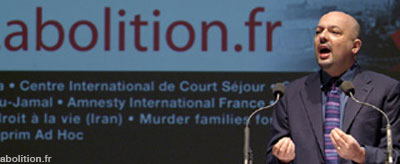Cutting rope
by Soheila Vahdati
10-Dec-2007
Piers Bannister, a researcher on the death penalty for Amnesty International, has had an active role in international lobbying for a global moratorium on the death penalty. A resolution [1] calling all states for a moratorium on executions, passed at the UN General Assembly Third Committee in November 2007 [2], leads up to a vote by the UN General Assembly. Piers, who has kindly answered some of my question about the death penalty in a previous interview [3], kindly agreed to talk more about international lobbying for the resolution.
Vahdati: Congratulations for the success on the first round of voting. What groups were involved and how long they have been lobbying?
Bannister: Many groups from around the world worked for this under the banner of the organization the World Coalition against the Death Penalty. This widespread campaigning was illustrated by the number of governments who took the opportunity to be cosponsors of the resolution with well over 80 nations from numerous regions backing the initiative. The campaign for this resolution started in the summer but the campaign to have a vote has been running for many years, backed by the anti death penalty group Hands Off Cain.
Vahdati: What lobbying mechanisms did you use? Did you lobby around the UN premises, or were activists and NGOs contacting country officials directly? What countries did you focus on, the possible “nay” votes, or the countries with possible abstain votes?
Bannister: Many lobbying techniques were used. We held a meeting at the UN which was addressed by three men who faced execution for crimes they did not commit. The testimonies from the three – from Uganda, Japan and the USA – were extremely powerful and moved many who heard them.
We also lobbied directly to representatives at the UN and to governments in their capitals. We targeted countries which might be persuaded to vote for the resolution or at least abstain. We also encouraged countries that were already very against the death penalty to use their influence to persuade nations they have good relations with to take a stand against state killing.
We held press conference both at the UN and in other regions to support the campaign and educate the media about the global trend away from the use of the death penalty.
Vahdati: Did you ever talk to the Iranian representatives?
Bannister: The Iranian authorities’ policy on the death penalty is well known. Although we seek to change that policy by the power of our argument we took the decision to target our limited resources on governments we thought more likely to respond positively.
Vahdati: Which countries were most vehemently opposed to the moratorium? Did Iran express its opposition vocally?
Bannister: The most vocal governments were (in no particular order): Botswana, Singapore, Egypt, Iran, Barbados and other Caribbean nations. The Iranian representative spoke often about his country’s objections to the resolution saying the death penalty was needed to deal with the nation’s drug and other crime problems.
Vahdati: What were the major arguments against the moratorium?
Bannister: That the UN had no authority to ‘interfere’ in the judicial systems of member states, that the death penalty was required as a deterrent to violent crime and that this only came from ‘the west’. These arguments were fiercely contested by the many supporters of the resolution who believe the death penalty to be a grave violation of human rights, that human rights are the concern of the international community and that the death penalty has never been shown to deter violent crime above other harsh punishments.
Vahdati: When is the date of the final round of voting at the UN General Assembly? Will the lobbying continue till then or do you think it will pass as it did before?
Bannister: The final vote will be in the plenary session of the UN General Assembly on 18 December. We continue to lobby countries that have ceased to execute to vote in favour and hope to push the vote in favour over the 100 mark.
Vahdati: Any interesting experience you would like to share?
Bannister: This is a major turning point in the fight against the death penalty. It may not stop executions in China, Iran and the USA but Amnesty International does believe that it will influence other nations who are already considering abolition. In time, we also believe that the major executing states will start to reflect on the international communities view on capital punishment and consider ending the killing of their fellow citizens.
Vahdati: Thank you. I wish you and all of the people who are fighting against the death penalty success.
| Recently by Soheila Vahdati | Comments | Date |
|---|---|---|
| Dealing with Past Political Crimes | 5 | Oct 18, 2012 |
| A Role in International Courts | 4 | Oct 10, 2012 |
حجاب و آفتاب | 2 | Jul 23, 2012 |


